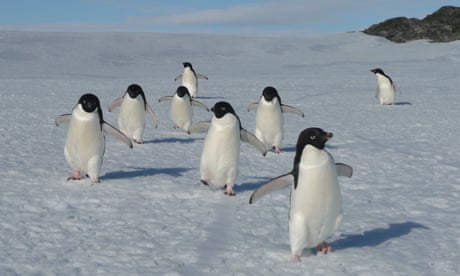- by foxnews
- 08 Apr 2025
Australian scientists observe ‘rapid’ decline in Adélie penguin numbers off Antarctic coast
Australian scientists observe ‘rapid’ decline in Adélie penguin numbers off Antarctic coast
- by theguardian
- 12 Oct 2022
- in news

Long-term monitoring has revealed a 43% drop over a decade in the number of birds that breed across 52 islands near the Mawson research station.
It is also contrary to models that had predicted a continued increase in this particular population, as had occurred in previous decades.
To collect the data, seabird ecologists surveyed the islands along a 100km stretch of coastline every year from 2010 to 2020 to monitor breeding pairs.
They found the number of occupied nests fell from 176,622 to 99,946, which translates to a decline of about 77,000 nests or 154,000 breeding birds.
The scientists believe it is a change in environmental conditions that has triggered the "rapid" decline of the Mawson population.
In research published in Global Change Biology, Emmerson and co-author Colin Southwell wrote that initial declines were likely caused by a period of extensive summer "fast ice" - which is ice that is attached to land but covers sea water - from 2004-05 to 2009-10.
They say this hampered access to foraging habitat resulting in virtually no chicks surviving in those years.
There has been an overall decline in fast ice in Antarctica, however scientists have noted there is regional variability, with declines detected in some areas and increases in others.
"Generally [the penguins] have to walk across the fast ice to open water to go foraging," Emmerson said.
"Chicks are only 90 grams when they first hatch. They're tiny things and at that stage they require frequent small meals."
She said the extensive fast ice meant parents had to travel further for food and did not get back as quickly and frequently as their chicks needed.
As the frequency of unfavourable breeding conditions remained high, the number of fledglings surviving when they left the colony during winter also began to decrease.
"We think the reason this decline has been so rapid is there are two processes occurring: one on the breeding animals over the summer and the other on the population leaving the colony over winter," she said.
"These two processes are feeding into each other, so as the population declined it has made the situation a whole lot worse for their survival."
The researchers estimate the population in a good breeding season had 80,000 fewer fledglings compared to the population peak in the early 2000s.
Jane Younger, a lecturer at the University of Tasmania's Institute for Marine and Antarctic Studies, said fledglings worked together as a team to to find food.
When the group was smaller, the penguins were more vulnerable to predators and were less effective at finding and eating prey.
"It's kind of a cascading thing that's happened where there's the initial decline in the number of chicks and because there's fewer of them, they're more vulnerable," she said.
Younger said the magnitude of the decline the researchers had found in the Mawson population was "surprising and disturbing".
"I don't think anyone would have expected this," she said.
Emmerson said the next step was to continue research to understand the drivers of fledgling survival in their first winter journey and to minimise any pressure on the population from activities at the Mawson station.
She said any fisheries activities would also need to be managed carefully.
- by foxnews
- descember 09, 2016
Ancient settlement reveals remains of 1,800-year-old dog, baffling experts: 'Preserved quite well'
Archaeologists have recently unearthed the remarkably well-preserved remains of a dog from ancient Rome, shedding light on the widespread practice of ritual sacrifice in antiquity.
read more


